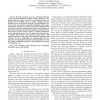Free Online Productivity Tools
i2Speak
i2Symbol
i2OCR
iTex2Img
iWeb2Print
iWeb2Shot
i2Type
iPdf2Split
iPdf2Merge
i2Bopomofo
i2Arabic
i2Style
i2Image
i2PDF
iLatex2Rtf
Sci2ools
121
click to vote
JSAC
2008
2008
Distributed Rule-Regulated Spectrum Sharing
Dynamic spectrum access is a promising technique to use spectrum efficiently. Without being restricted to any prefixed spectrum bands, nodes choose operating spectrum ondemand. Such flexibility, however, makes efficient and fair spectrum access in large-scale networks a great challenge. Prior work in this area focused on explicit coordination where nodes communicate with peers to modify local spectrum allocation, and may heavily stress the communication resource. In this paper, we introduce a distributed spectrum management architecture where nodes share spectrum resource fairly by making independent actions following spectrum rules. We present five spectrum rules to regulate node behavior and maximize system fairness and spectrum utilization, and analyze the associated complexity and overhead. We show analytically and experimentally that the proposed rule-based approach achieves similar performance with the explicit coordination approach, while significantly reducing communication cos...
Related Content
| Added | 13 Dec 2010 |
| Updated | 13 Dec 2010 |
| Type | Journal |
| Year | 2008 |
| Where | JSAC |
| Authors | Lili Cao, Haitao Zheng |
Comments (0)

